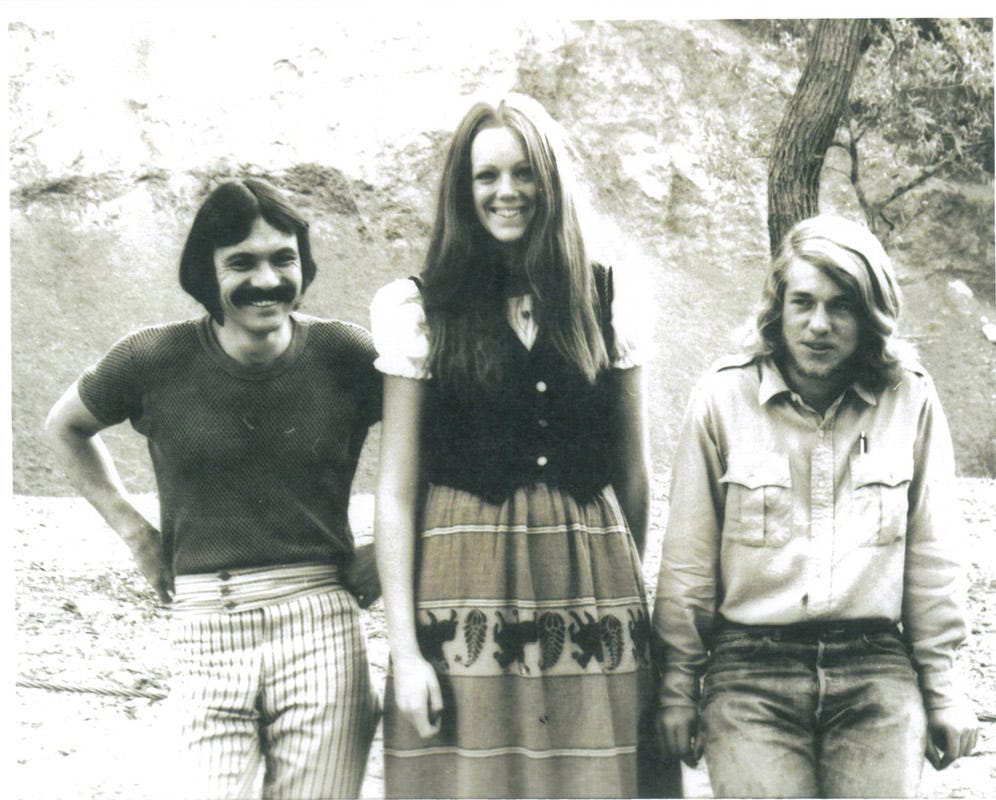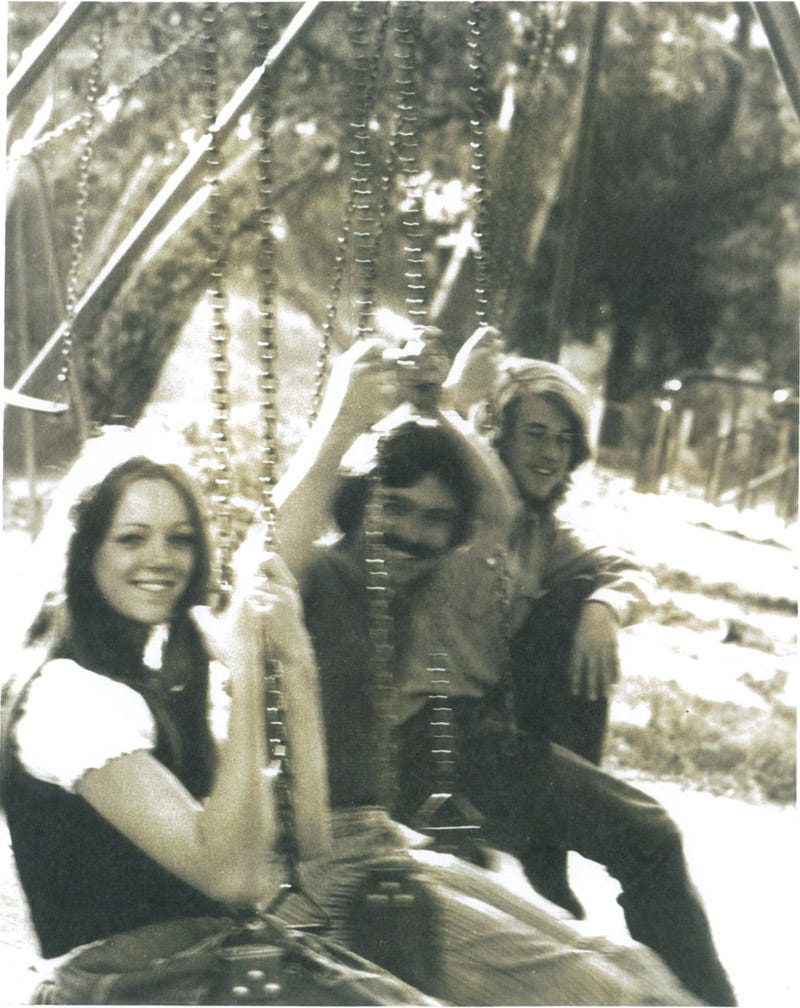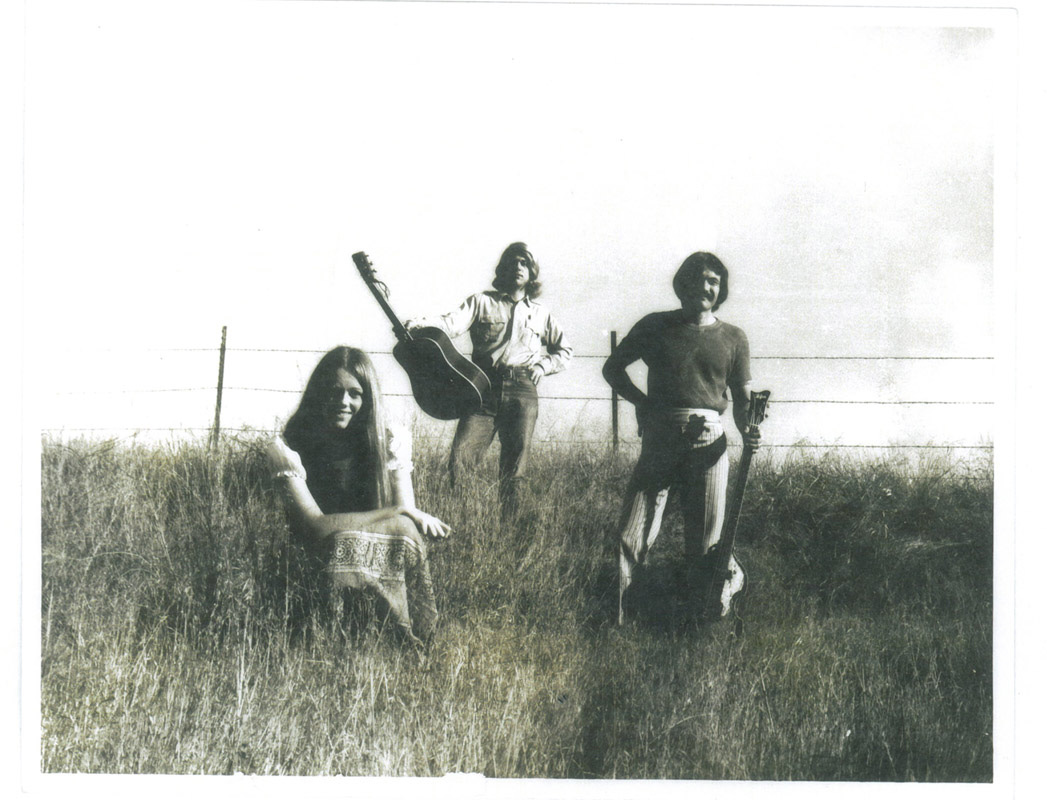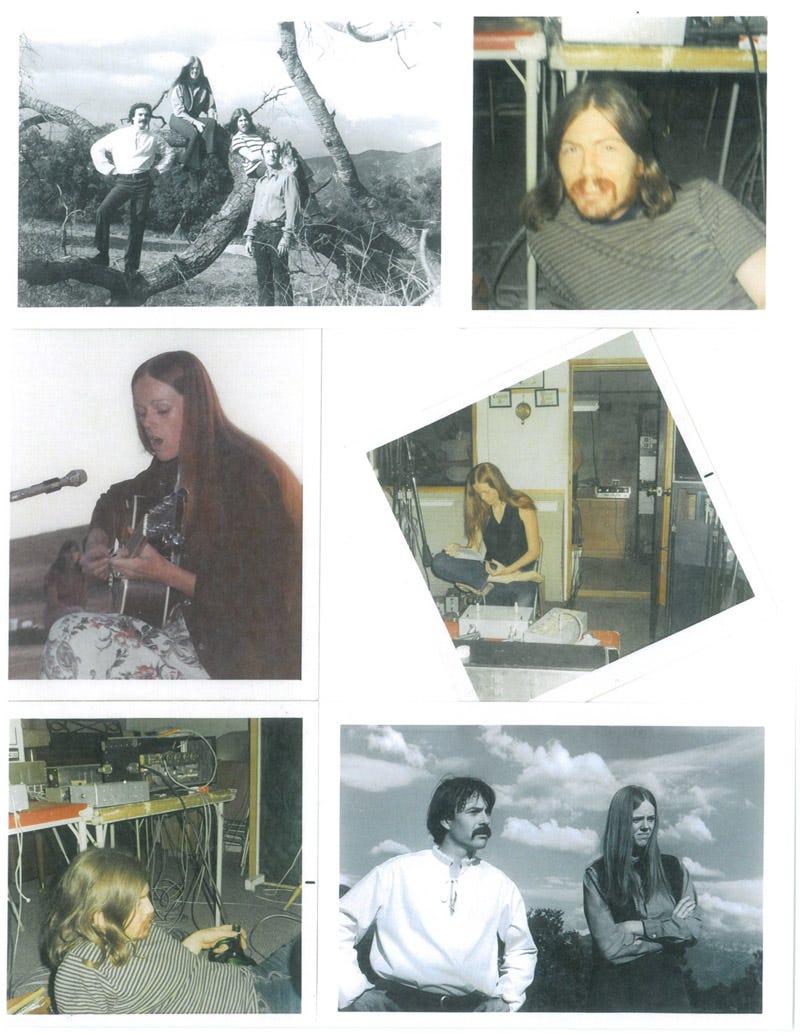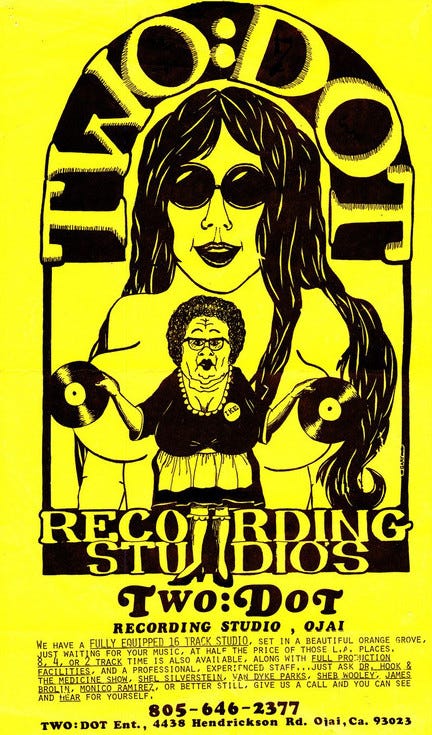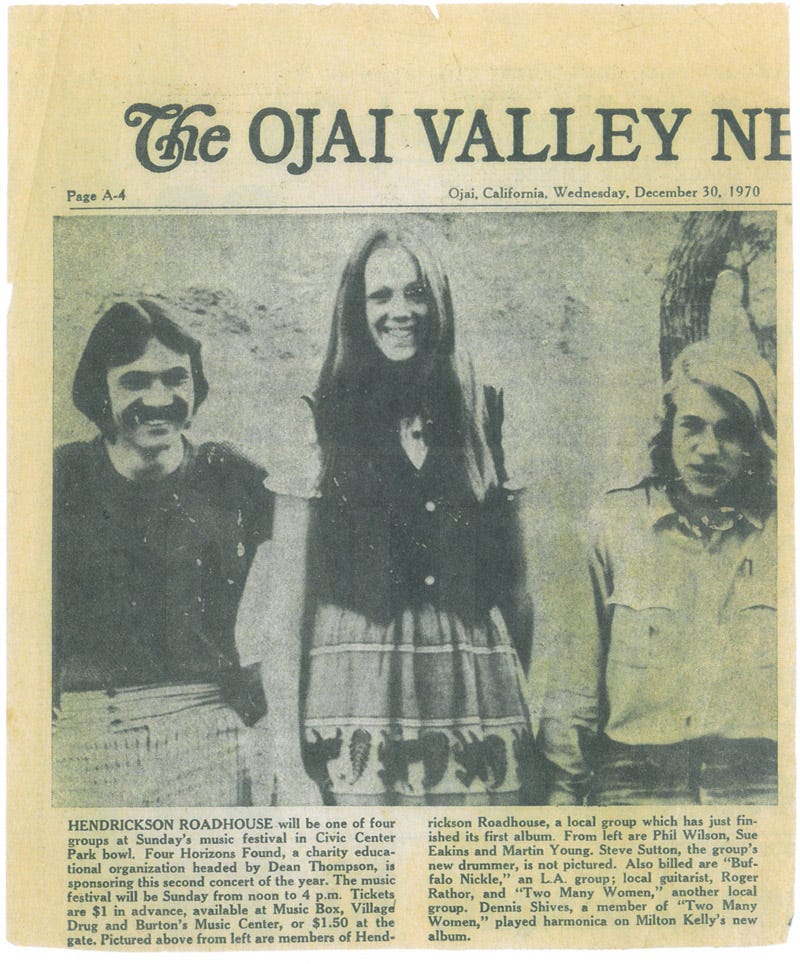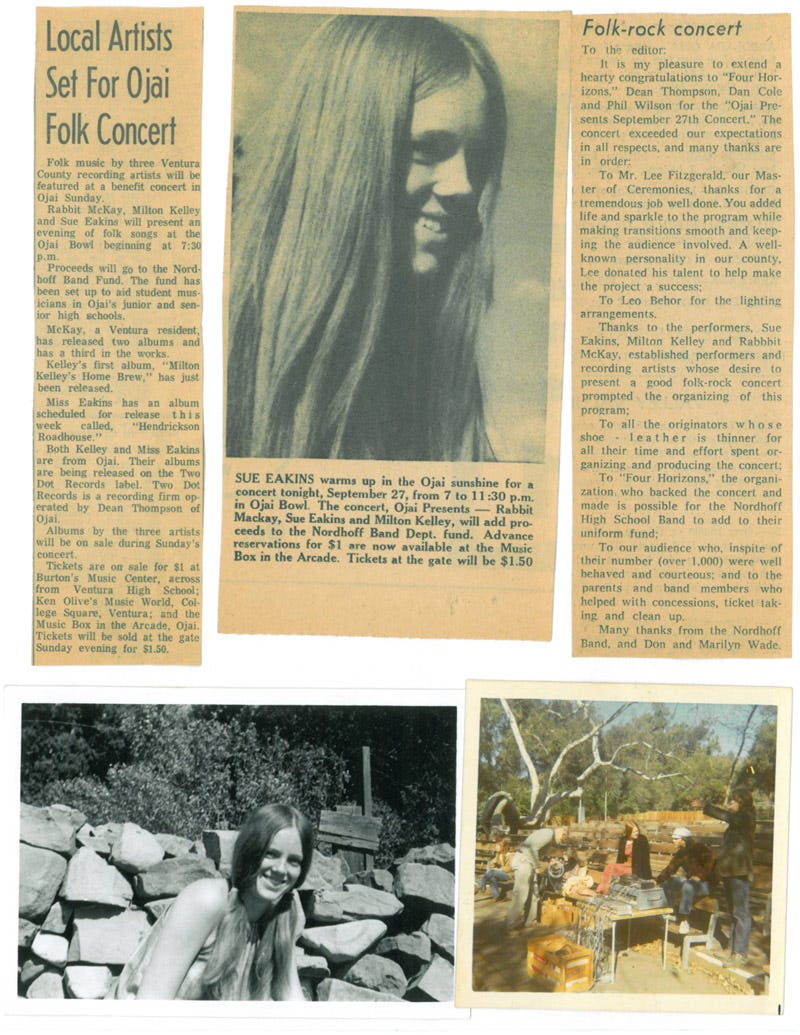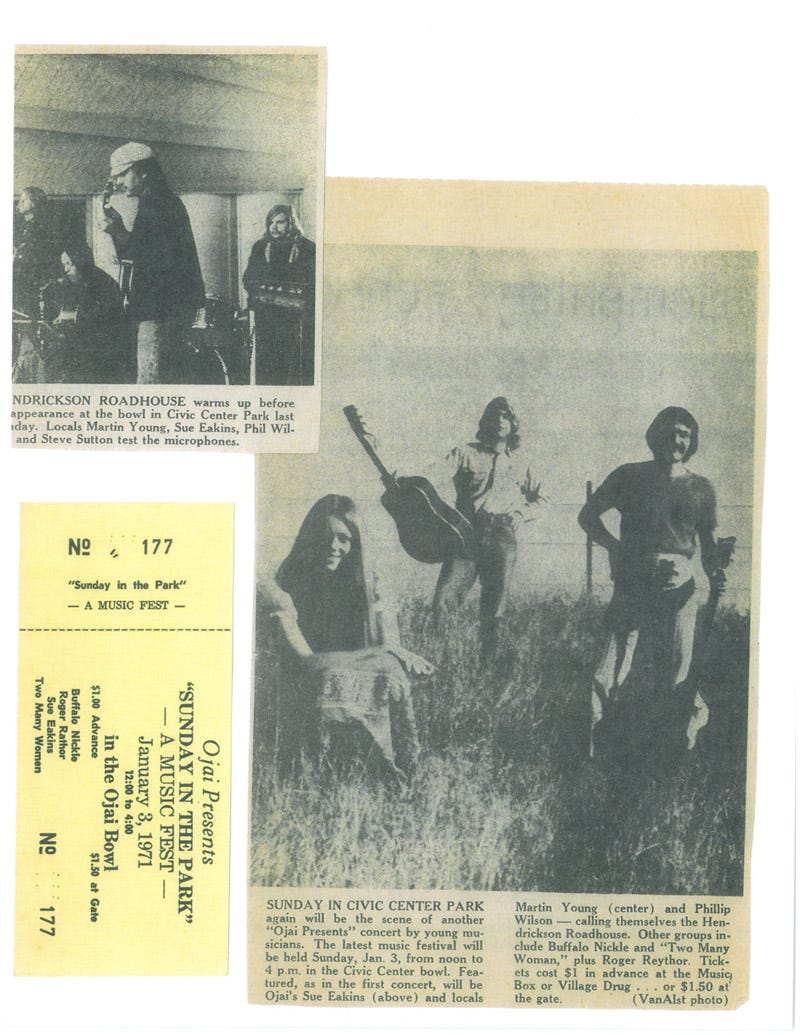Sunny Day Rain
An Update On Sue Akins, Hendrickson Road House, and A Previously Unheard Two:Dot Recording
This past weekend we harnessed up the dog and ditched Los Angeles for a day of respite in Ojai. Usually when I’m out and about in Ventura County my Two:Dot spidey-sense starts tingling. I can’t help but duck into any and every antique shop in the hopes of finding the one-sided Arthur demo, or an as-yet undocumented release.
While this trip was rewarding in the sense that we enjoyed local food and wine, it was unsuccessful on the vinyl front. Alas, whenever I’m in the Ojai area Sue from Hendrickson Road House is not far from my thoughts. When we returned to the city, I sat down and wrote her an email to see how she’s doing. I asked if she maybe wanted to catch up on life since the Tenth Planet reissue ten years ago.
The response that I received was unexpected, shocking, and saddening. Next week (1/20) is Sue’s 73rd birthday, and for the past few months she’s been dealing with serious medical issues. As of the last time we spoke there is no firm diagnosis or treatment. She just informed me that the months ahead will get very serious very fast.
I ask that you keep Sue in your thoughts, send some positive vibes through the ether, and I’ll post an update when I have more information. Maybe there’s something we can do as a collective to help make this experience easier for Sue. Any suggestions are welcome, feel free to leave a comment.
Sue said if she could deliver a message to anyone reading this, it would be not to ignore a doctor’s requests for regular wellness check-ups and age-related examinations/preventative procedures.
I want to include in this post my old interview with Sue for anyone who might not have read it before. It is probably the one I am most proud of in my fifteen years of maintaining the old website. Getting to know Sue and tell her story was an informative and fun experience, and the results turned out to be quite important as the HRH reissue materialized not too long after. Sue echoed that sentiment, writing recently that she fondly remembers meeting people like myself, Bob Howe, and David Wells along the way.
First, I wanted to share a recent Two:Dot related discovery that is HRH related. Someone I know through work grew up in Ojai, and attended Nordhoff High School in Ojai around the time Two:Dot Studio was creatively thriving. Although he and Sue never played together, he remembers meeting her once. He played music both in school with the Gold’n’Blue Singers and in local bands. His recounts friendships with Norman Lowe and his brother Curt, as well as Phil Wilson, Martin Young, and Alan Thornhill, whom he played with for years.
He knows all about my Two:Dot obsession, and recently presented me with a very special gift: A CD transfer of the unknown Two:Dot tape he first showed me in 2018. It was recorded in 1971 at the studio with him on drums, and Nathan Lowe on lead guitar and vocals, and Curt on bass. With his permission, here is one of the songs from that three-song tape.
Norman Lowe Group: “Hey Baby”
E: Evan
S: Sue
E: Why don't you tell me a bit about yourself? Were you born here on the West Coast? Have you lived here your whole life? What about your school, run-ins with the law, parents, and early musical interests?
S: First, I'd like to thank you for inviting me to participate on your blog. You gave me some free publicity and promoted my music. I support Fair Use. You are a "good guy".
In answer to you first question: I was born in Ventura, California. I lived on Vista Del Mar Road overlooking Pierpoint Beach. My grandmother lived five houses away. I loved my ‘Nana’, and lived only for her praise. She was a prolific artist and had art shows around California. I was artistic as well but music turned out to be my thing. I did spend all of my youth there. But most Venturans will admit they wander off, only to return later for good. I didn't.
I was a good student. I loved learning. I got very good grades but was often cited for talking too much. I was very tall for my age (5'7" in 5th grade). I soon learned that I had better act like I was a lot older or people would think I was a moron! I became very poised and calm. In fact, I became a very poised and calm rebel! I was the one who talked to the police if they showed up for some reason. I once played Bob Dylan's "Lay Lady, Lay" for about thirty minutes while police surveyed a huge party in Ojai. The bad boys were quiet. I don't have a [criminal] record. I did once spend about 12 hours in Juvenile Hall for — get this — leading an idle, immoral, and dissolute life. I left home a few too many times and was granted emancipation. I moved to Ojai. My parents then happily went on to complete their divorce (no judgement, parents do their best, as did I).
When I was five or six my Dad brought home an old beat-up upright piano from church. I couldn't believe it. I was all over it. One finger, sometimes two. I was playing "Gravy Waltz", "Exodus", "Midnight in Moscow". One-fingered, but with soul! I blew off recess to play the piano in the auditorium at school. I loved jazz but the piano went away some time later. Very sad. When I was twelve my Dad gave me the gut string guitar I had been pining over for several months. He and my Mom pulled it off like a joke: she implied I was in trouble and he was in the garage, holding the beloved guitar. That was…1963? It was summer. I played day-in and day-out until one day, my mom popped in to say, "Turn the damn radio down!" I said “It's not the radio, it's me!” And she said, "You sound as good as the radio!" Wow. What can be better than that?
E: How would you describe your earliest musical influences?
S: When I was growing up my parents had a big RCA Hi-Fi turntable and AM/FM radio. It was awesome. They had music to die for. Tchaikovsky's 5th in D-minor, the 1812 Overture, the Nutcracker Suite, Carousel, Paint Your Wagon…before I started kindergarten I was listening to all this stuff. I was banging away on the coffee table like I was playing a piano. Very dramatic. My mother rolled her eyes.
As a pre-teen and teenager I listened to Peter, Paul and Mary, Joan Baez, and Judy Collins. Joni Mitchell burst onto the scene and blew everyone away. The Byrds, Buffalo Springfield, Cream, CSN&Y…I was listening to Steely Dan, the Stones (of course)…one artist you may not be familiar with is Laura Nyro. Piano and voice. This woman could sing. And she could write like no one else. I guess she was classified as R&B but she was way more than that. Pretty much, though, she was underground. My favorite song of hers is "Buy and Sell":
"Cocaine and quiet beers, sweet candy and caramels / Pass the time and dry the tears on a street called buy and sell"
It's about how simple, every day people get addicted to cocaine and heroin. And how it all looks so normal on the street. She died an untimely death a few years ago. I loved her music.
From there, I moved to Jimi Hendrix, Janis Joplin, Jim Morrison…sounds like a "J" funeral. Now it's Soundgarden, Stone Temple Pilots, Pearl Jam, or Smashing Pumpkins. I love jazz, too. Wayne Shorter, Pet Metheny, Terence Blanchard, Eddie Harris, Gene Harris…
I guess my message is this: When the goin' gets tough, remember your beloved music. It's where you came from.
E: How long before Hendrickson Road House did you begin writing songs? Did you have a solo career at all before HRH?
S: I think the first thing every young guitar player does after learning three chords is write a song. The first two that stuck were "That's All There Ever Was" and a song called "Pass The Hat". Luckily, I have the reel-to-reel tape, which will never see the light of day. You have to remember that I was around 17 when Phil Wilson and I started playing together, and 19 when we recorded. I wasn't exactly a woman of the world.
E: Whoa. I had no idea you were so young at the time! As the principal songwriter of the group, did all ideas come from you or was there input from other members of the band?
S: Dean Thompson [Two:Dot Studio owner] wanted to produce a demo record of my material. The band was formed to make that happen. Phil Wilson was the core person (not to mention a good friend). He contributed heavily in arrangements and overall management. Norman and Don were guest performers. That is not meant to diminish their contributions, but rather to define what the overarching goal was. And it was not to promote a band. We were all told that no one would be paid for their efforts. I was always open to good suggestions. For instance, on "Tomorrow Your Sorrow," Norman suggested the 3/4 time change, and he was right. It flowed flawlessly. It made the song more interesting.
You may be wondering about "Yessircantoo!" which Norman composed. Prior to working with us, he also played in another group, of which Don Mendro was the drummer. The two of them whined, whimpered and flat-out begged for a chance to do a debut song from their group. Towards the end of the sessions, I threw up my hands. We were all tired, and even Dean was worn down, so we said, "OK already!" It had nothing to do with HRH. It probably shouldn't have been there. But it was an "Ojai kind of thing to do." And I will tell you now, that it will not be on any reissue. Norman passed away tragically. His song was probably never copyrighted and he has surviving family. Out of respect for them, I will not profit from his music.
E: Did everyone live in Ojai at he time or was that just where the label/studio was located?
S: At the time we were all living in Ojai. Anyone who was doing anything musically was in Ojai. It was a haven for musicians and artists of all kinds. It still is, I hear. I lived in a little housing group called Cottages Among The Flowers, across from Phil Wilson, his wife, and their young son. They were very kind to me. I had bailed from home and Phil helped me get a job. We started playing music. I am forever grateful to them. Norman lived in an area called Meiners Oaks with his wife Ramona. Don lived at Electric John's house, out there somewhere. Two:Dot Studio was located at the east-end of Ojai, out in orange orchards. I house sat for him once and had to milk his goats.
This all took place in a much simpler time. Things unfolded closer to real time. There was time to think about what we would say or do. There was a caring about the consequences of our decisions. There was no desire to shock or offend just for effect. People wanted to get their thoughts and beliefs out to affect possible change. That was 1970. It's very different now.
E: How did you connect with Two:Dot? I know shockingly little about the actual studio/label, so you can be as thorough as you want with your answer.
S: Phil Wilson and I are a little fuzzy on this. He played with a trio which he called a "Proud Mary" band. They did a demo at Two:Dot and he talked to Dean about me and my music. Dean requested a meeting with Phil and me. I played for him and he recorded it. Later he said he wanted to produce a record of my original songs. We couldn't believe it! Of course we said "Yes". Then I sai, "Oh my God, I have two songs"! and Phil said to me, "Write some more songs, Sue".
Perhaps now is a good time to explain the Two:Dot mystery. Dean Oscar Thompson was the first DOT. Joanne, his wife, was number two, DOT. Thus, Two:Dot. Dean was a sound expert. he was affiliated with the H.E.A.R. Foundation and possibly others who tested infants and children for hearing problems. He had many other gifts of which I had no knowledge. He was a very special person. Joanne (his wife) is 85 and vivaciously alive. I spoke to her a few months ago. She still plays the [Hendrickson Road House] record!
Dean was not a PR guy. I think he was dabbling in what he thought was the newest, happening music scene in his immediate experience. And he was right. To name a few of those "happening" people: Milton Kelly, Alan Thornhill, Rabbit McKay, Martin Young, Raj (Roger) Rathor, Dennis Shives, Luke Sullivan and many more I can't remember.
But back to Two:Dot. So, Dean was a sound guy and not a PR guy. He had the album pressed in Los Angeles along with the 45rpm. We all got several copies. But no one knew what to do after that. There was no plan. Dean's sons were going off to college, so they each took several copies and gave them away. Within a year, we were hearing of copies turning up all over the continental US. We played a few more events as a band and then the group disbanded. Phil and I continued to play local venues for a couple of years.
Then, slowly, the news leaked that somehow, the master tapes had been copied over. I know that took a little wind out of my sails. But I've always said that some things are just not meant to be. I still believe that. But my alternate belief is that there is always a way.
E: After that initial meeting with Dean, when did you finally go into the studio? How long did it take to cut the record? What was the recording experience like?
S: You know something, Evan? I honestly don't remember when we started recording. I know the album came out in December of 1970. Ojai can be extremely hot in the summer — bad fire seasons — and quite cold in the winters. It snows sometimes. I think it took about seven or eight months to get it done. Everyone worked a day job. I remember hanging around outside when we started and heading indoors towards the end.
Dean was a very tolerant man. And it's a good thing, too. I was nineteen and the boys were all older than me. They were the yahoos while I tried to be the respectable, mature person. I must admit that Phil Wilson was very restrained. I will answer your unasked question: Yes, people did get high. And drunk. I did not ask questions about states of mind. I personally did not partake in substances while actually recording. I had already done it while writing and composing. I felt obligated to be totally present for this wonderful man who was giving us this incredible opportunity. I was able to keep things under control. But there was no controlling Norman. It was no secret that the more Norman drank, the better he played. He would reach out and find what he was looking for. He would reach back and retrieve the perfect riff. I think he could have gone on to become a renowned guitar player in blues and jazz. It pisses me off that he is not here.
I had so much fun working with Dean and the group. But my absolute best time was when Dean and I worked on my solo songs together. Back then, my voice wasn't as strong. He discovered that overdubbing and double-tracking were ways to enhance my voice. So songs like "Theater King", "Helping Hand", and "I Wondered" were very fun to work on. He somehow knew what I wanted those songs to sound like. He would say, "Come on, just on more track and it will be perfect!" How lucky could I get? And when we listened back, full blast in the studio, it was awesome. Some of the harmonies were actually eerie!
E: Now's probably a good time to ask about some songs of yours I've been listening to a lot lately. What can you tell me about the first track on the album, "Forget About You"?
S: The lyrics to "Forget About You" do seem straightforward, don't they? And in a way they are. I think most songs people write are like masks: they may explain, they do not always tell the whole truth, but maybe just enough. When we are young and go out on our own, we are free! Free to make mistakes and free to discover that we must live with those mistakes and deal with them. "Forget About You" and "Seed That Grows" are sister songs. Miles apart but deeply connected. Non-local, as in physics. I think "The Seed that Grows" is fairly transparent. "Forget About You" is about loss on two levels: physical and emotional. I think you'll have to use your imagination from here on!
EL: What about "Tomorrow Your Sorrow"? It seems simple…
SR: This song is probably the most simplistic song I've ever written. It has basically two little verses! It felt like it was a "Moon in June" song. But for some reason everyone liked it. I think it had a lot of room for improvement. It was basically unfinished. Norman threw in his two cents and we added the 3/4 time change. I think Phil said to give Norman more lead guitar time, let him wail. I said okay, being the genius that I was. Here are the lyrics, for the most part:
You lie, you cry
You try to make me change my mind
You sigh, then you reply
That it's only going to take more timeBut I can see it
When I look into your eyes
That you're never, no
You're never going to changeTomorrow your sorrow
Won't take away the sadness
Today you'll stay
Not try to hide your madness'cause I can see it
When I look into your eyes
That you're never, no
You're never going to change
The guys rocked on this song, I think. I played rhythm and I just filled in the blank spaces with some silly words, but it all worked. Phil's bass line was great, as usual. He also made "Forget About You" with his bass line.
E: And, lastly, "Classical Misconceptions Part I & II"
S: It makes me happy that you asked about this track. No one ever has and I've always loved it! When I was around twelve years old, my grandfather lived with us. He was a very colorful man — married four of five times — and one of his ex's was very fond of my dad. She called one night to tell him several times that she was certain Jesus was going to call her home that very night. My dad looked out for her as best he could. He talked to her, thinking she thought she just might drop dead for no reason. In the morning, Dad was gone. After he'd called her back there was no answer. She did the deed with Aspirin. My parents were very direct. My dad said she was old and lonely. I wondered what it was like for her. I would go through four days of hell to have a barbecued hamburger on Saturday. I would suffer church for fried chicken and mashed potatoes and gravy. I truly suffered until I got my first guitar, but then…I wasn't 75-years old and alone. I tried to make all my lyrics audible on the album. Here are the ones for this song:
You're listening to the sounds running all around your head
Watching memories dancing all around your bed
Dreams are your relief, my friend, but your dreams
Have been your true belief and on and on
Until the very endShake the morning from your eyes
You can't ignore the day
Try to think of all the good things
That happened your way
Don't be sad because you're old,
Life is like a little star
That never grows up to grow cold
I want to apologize for the big clunker in the middle. Dean said, "Do you want a retake?" I said "No, unless you want to cut off my left hand afterwards." That was a finger-bleeder of a song. I never completely mastered it.
E: Did you record any more material for Two:Dot that wasn't included on the album?
S: Everyone wants to know about auctions for unreleased material. I know that the record albums in good condition sell for way too much! I've seen acetates on eBay sell for $240. Auctions for "unreleased material." One auction showed a record's starting bid of $400, and it sold for $760. Anyone could get a 15-year-old girl to bang on a guitar and label it "Sue Akins unreleased songs" and put it on an acetate. But I can tell you now, there is no unreleased material that came out of Two:Dot studios. I have the only unreleased material in my hands. I would be happy to verify for anyone whether an acetate of other recordings is actually mine. I think it's fun that people can make money off this, but I don't want people to get ripped off. I can tell you in five seconds if the material is mine.
To answer your question, I didn't do any more recording at Two:Dot. Anyone could have recorded material at a live event and made an acetate.
E: How long did it take until you realized there was this underground interest in HRH? How long until people started contacting you asking if you had copies of the record? I imagine more people came to know about the band and music as the Internet made it easier to track down people as well as hard-to-find recordings.
S: You know, a few years ago I had searched lightly under Sue Eakins/Sue Akins and never found anything. It never occurred to me to search under Hendrickson Road House. After the fateful call from [redacted] on June 28th, 2010, I learned it all. It was quite the shock/surprise. But you know, it's all okay. I got back in touch with Phil Wilson. It reawakened the musician in me. I've started playing guitar and piano again.
It wasn't until I popped onto a few blogs (like yours) and said, "Hi I'm not dead" that I started hearing from people all over the planet. I just fulfilled a mailing to a gentleman in the UK who happens to be quite the music scholar. There hasn't been a huge number of people but they are all from all over. It seems to come and go.
I got an interesting demographic from RYM, which said the people who listen to my music are generally males from 17-44 years old. It seems to be true. I can only guess that all males want to find out how women really think when it comes to the man/woman relationship. I think most of my songs address that subject on one level or another. Men are designed to "fix" things. They aren't designed to listen to lamenting and venting. Females should do that with other females… Listening to a song must be so much easier for guys. It's definitely more entertaining…and you can turn it off!





